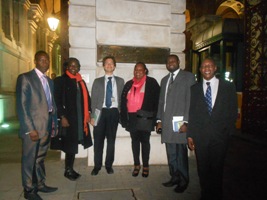Uganda is a failed state – British govt told
By George Murumba
21st Nov 2011:
A team of Ugandan opposition political activist living in the United Kingdom [UK] have taken their campaign against President Museveni’s National Resistance Movement [NRM] government to the British Foreign and Commonwealth Office in London.
The activists met the African Team at the British Foreign and Commonwealth Office [FCO] on Friday November 16th and urged the British government to put pressure on the Ugandan authorities to stop what they called the “…excessive use of force and illegal imprisonment of opposition activists and Journalists”.
In particular, they mentioned the deteriorating human rights condition, illegal imprisonment of opposition activists, and President Museveni’s interference in the ongoing parliamentary probe into suspicious oil deals. The opposition delegation pointed out that these were the “…obvious symptoms of a failed state. How else can a country function when the people’s representatives are silenced by the government?”, they wondered.
They also raised concerns over what they called “the barbaric” Public Order Management Bill and the Press and Journalist Bill which they said is intended to suffocate the press and the public. The Ugandan opposition team also told their British hosts that “…it is now evident that Ugandans are fed up of Museveni’s dictatorship and are happy to consider an alternative government.”
The five-man team of Ugandan opposition activists also raised their concerns about the British government’s continued support and provision of aid to the Ugandan government despite what they said was Uganda’s “…inability to resurrect the collapsed institutions and governance systems.”
Ms Belinda Atim, who was one the activists who petitioned the British government pointed to the recent Amnesty International report which she said shows that “…human rights and democracy in Uganda has diminished beyond recognition.” She also said the framework of democracy is human rights laws and yet in Museveni’s Uganda human rights only applies to “…those in the top layers of government.”
Charles Mugagga, who was also part of the Ugandan delegation, rhetorically asked: “…What would stop a man from taking to the streets if he can’t afford school fees and other basics for life while his country buys fighter jets for $744 million dollars?” He also pointed to youth unemployment of approximately 80% as one of the reasons for the growing discontent with Museveni’s government.
Mr Richard Semitego, a common opposition protester in London who subscribes to the political pressure group Ssuubi 2011 was also part of the team. He said, “…in the eyes of many Ugandans, the 2011 February general elections were flawed and therefore Museveni’s current government is an illegitimate government.”
Others on the opposition delegation were Mr. Bosco Nyeko and Ms Margaret Lakidi who between them emphasised the need by both the British government and the European Union to reinforce accountability mechanisms lest their good humanitarian intentions towards vulnerable Ugandans turn into “…a moral disaster.”
In their response, the Africa Team at the British FCO told the Ugandan activists that the UK government continues to engage the Ugandan Government to place strong emphasis on public financial management. The Africa Team also said the British government had issued “tough call” to President Museveni to iron out corruption.
Whereas the opposition has consistently pointed to a looming political crisis in Uganda, the ruling NRM government has often dismissed their concerns as scaremongering. END. Please login to www.ugandacorrespondent.com every Monday to read our top stories and anytime mid-week for our news updates.
![]()


